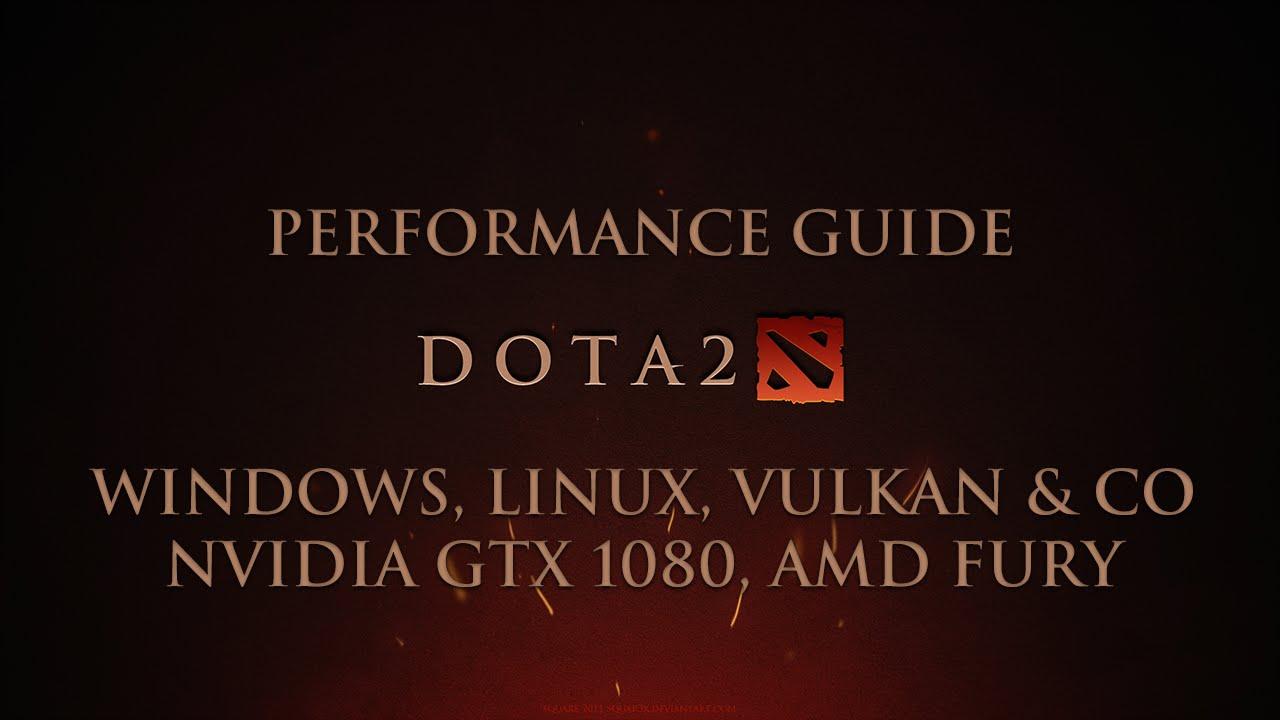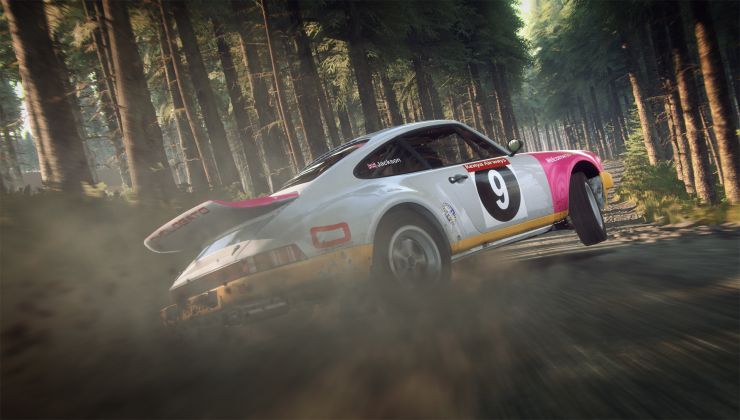This is sad to see. A new benchmark video for Windows and Linux using Dota 2 actually shows Windows doing quite a lot better than Linux.

I spoke to the person who did it on twitter, he mentioned both Windows/Linux were done in borderless fullscreen mode. The Linux Nvidia driver was 367.17, while Windows used 368.25. As for AMD Windows used 16.5.3, while Ubuntu used amdgpu-pro.
I said before plenty of times that Vulkan will not be some magical bullet to bring Linux performance up on par with Windows. There can be problems elsewhere contributing to the performance drop on Linux. It could be X11, it could be a compositor issue, it could be lots of things.
I'm certainly no expert in these issues, but seeing Vulkan perform worse than OpenGL at 4K on Linux was quite disappointing to me. At least in lower resolutions Vulkan was performing better than OpenGL on Linux. The major issue is just how much faster Windows is with Vulkan than Linux.
What are your thoughts, any theories?

YouTube videos require cookies, you must accept their cookies to view. View cookie preferences.
Direct Link
Direct Link
I spoke to the person who did it on twitter, he mentioned both Windows/Linux were done in borderless fullscreen mode. The Linux Nvidia driver was 367.17, while Windows used 368.25. As for AMD Windows used 16.5.3, while Ubuntu used amdgpu-pro.
I said before plenty of times that Vulkan will not be some magical bullet to bring Linux performance up on par with Windows. There can be problems elsewhere contributing to the performance drop on Linux. It could be X11, it could be a compositor issue, it could be lots of things.
I'm certainly no expert in these issues, but seeing Vulkan perform worse than OpenGL at 4K on Linux was quite disappointing to me. At least in lower resolutions Vulkan was performing better than OpenGL on Linux. The major issue is just how much faster Windows is with Vulkan than Linux.
What are your thoughts, any theories?
Some you may have missed, popular articles from the last month:
All posts need to follow our rules. For users logged in: please hit the Report Flag icon on any post that breaks the rules or contains illegal / harmful content. Guest readers can email us for any issues.
So you're using a different demo file to me then, I am using the same one the guy who did the video provided which is why I imagine my results are so different. The one in the video is much heavier.
0 Likes
So you're using a different demo file to me then, I am using the same one the guy who did the video provided which is why I imagine my results are so different. The one in the video is much heavier.
Yeah, I'm using some demos provided by the Valve team/guy. I asked on Phoronix about some demos that he (Dan I think?) considers relevant for Vulkan and these are what he posted.
0 Likes
Those are just what he happened to be testing with, doesn't mean the are the best. Just different.
0 Likes
Those are just what he happened to be testing with, doesn't mean the are the best. Just different.Well yes, you're bound to get different results depending on what demo you use.
Even those from Dan give different results although they are both meant to prove Vulkan performance. The one that I used is the most spectacular (on my configuration) in performance gain (GL vs VK).
Last edited by dubigrasu on 15 Jun 2016 at 9:08 pm UTC
0 Likes
I'll add some details in a moment but this is what I get on SteamOS:Interesting. So according to your test, SteamOS kicks Windows to the curb in both OpenGL and Vulkan, but particularly Vulkan.

SteamOS Alchemist (kernel Linux steamos 3.10-5-amd64)
Windows 10 Pro
i7-4790K
16 GB RAM
Nvidia GTX 780 with
Linux Nvidia driver 367.27
Windows Nvidia driver 368.39
Demos were ran for 10 times each for both systems.
SteamOS BPM stands for the default SteamOS configuration with steamcompmgr, the others test were made in desktop mode (Gnome 3).
Between this and the OpenBenchmarking test, I'm beginning to the think the kid in this video screwed up his Linux benchmark.
https://openbenchmarking.org/result/1606109-HA-DOTA2AMDG22
0 Likes
Between this and the OpenBenchmarking test, I'm beginning to the think the kid in this video screwed up his Linux benchmark.Well, I don't know. Like I said, you get different results depending on what demo you use. Maybe I should've use the same demo he used for a strict/correct comparison?
But basically Valve's Dota dev said that those two demos (from Phoronix) are the ones to use when testing Vulkan...so I used one.
0 Likes
Those are just what he happened to be testing with, doesn't mean the are the best. Just different.Ah well (I misread your post), when Phoronix tested "some" random gameplay DanG said that they were not giving a full image of what Vulkan can do, so that's why he provided the ones I used.
From what I understood they are actually the best for this task, as in putting Vulkan to work.
Last edited by dubigrasu on 15 Jun 2016 at 9:50 pm UTC
0 Likes
Thanks Dubi for the benchmarks, we have another point of view on the situation.
All is not as gloomy as it seemed, afterall... In fact, your benchmarks are quite positively impressive.
Last edited by Mohandevir on 15 Jun 2016 at 9:56 pm UTC
All is not as gloomy as it seemed, afterall... In fact, your benchmarks are quite positively impressive.
Last edited by Mohandevir on 15 Jun 2016 at 9:56 pm UTC
1 Likes, Who?
It is. Because it's way better than with OpenGL .. still.
And that there is work ahead for the driver developers - we knew that.
In comparison, they have a lot more experience with this kind of API in Windows bringing it close to DX12 than in Linux. Besides that, we can't consider Linux as the major platform. But we COULD benefit from games adopting Vulkan in Windows, so the real good performance in Windows could in the end help us. And if NVidia and AMD optimize their drivers more, we could get close to the performance. And I'm sure they'll work on that over time.
With the direction of Microsoft pushing services rather than APIs, we could see a change in their stance to DX too one day, as "we don't care what graphics API you use on XBox".. but we're still ages away from that. Though, they have been moving really fast on things like that lately. SQL Server for Linux? C'mon, who expected that?
Last edited by STiAT on 15 Jun 2016 at 9:59 pm UTC
And that there is work ahead for the driver developers - we knew that.
In comparison, they have a lot more experience with this kind of API in Windows bringing it close to DX12 than in Linux. Besides that, we can't consider Linux as the major platform. But we COULD benefit from games adopting Vulkan in Windows, so the real good performance in Windows could in the end help us. And if NVidia and AMD optimize their drivers more, we could get close to the performance. And I'm sure they'll work on that over time.
With the direction of Microsoft pushing services rather than APIs, we could see a change in their stance to DX too one day, as "we don't care what graphics API you use on XBox".. but we're still ages away from that. Though, they have been moving really fast on things like that lately. SQL Server for Linux? C'mon, who expected that?
Last edited by STiAT on 15 Jun 2016 at 9:59 pm UTC
0 Likes
Does anyone know if there's anything about the way Vulkan drivers are being developed (by NVidia in particular) that would put it behind Windows in performance?
I've always heard that they just aren't developing the OpenGL drivers as well on Linux as they do on Windows, but is that going to be a problem with Vulkan too?
As far as I know it's a much simpler API, so can we expect that at least from the driver perspective we should be at parity with Windows Vulkan drivers in the not too distant future, where most performance differences would be in the games code itself rather than drivers?
I've always heard that they just aren't developing the OpenGL drivers as well on Linux as they do on Windows, but is that going to be a problem with Vulkan too?
As far as I know it's a much simpler API, so can we expect that at least from the driver perspective we should be at parity with Windows Vulkan drivers in the not too distant future, where most performance differences would be in the games code itself rather than drivers?
0 Likes
Linux Nvidia driver was 367.17No such driver version seems to exist. [367.18 didn't support the card](http://us.download.nvidia.com/XFree86/Linux-x86/367.18/README/supportedchips.html),
Edit: If you look in the [youtube comments](https://www.youtube.com/watch?v=alrEyjTRag8) (rather than more info) he says 367.18.
Last edited by N30N on 16 Jun 2016 at 6:58 am UTC
1 Likes, Who?










 How to set, change and reset your SteamOS / Steam Deck desktop sudo password
How to set, change and reset your SteamOS / Steam Deck desktop sudo password How to set up Decky Loader on Steam Deck / SteamOS for easy plugins
How to set up Decky Loader on Steam Deck / SteamOS for easy plugins
See more from me